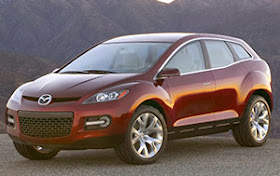 |
| #1 Mazda CX-7 |
Trade-ins are a great measurement of that emotional question. Most consumers who trade their vehicle will get a price hundreds to thousands of dollars less than retail. Car dealers not only know the wholesale market, they know the retail market as well, and are often able to get cars repaired for a lot less than most car owners.
This isn’t always the case. Clean cars can sometimes be traded-in at a retail price, and then financed to a sub-prime car buyer for even more money. Dealers who specialize in a given car brand are usually more effective in marketing and selling that specific name, and they also get a greater share of trade-ins from the brand — along with a better selection of clean vehicles.
To remove this bias, I decided to gather data on trade-ins sent to wholesale auctions by large used-car retailers and other regional used-car retailers that don’t cater to a single automaker. This way there wouldn’t be an over-representation of a given brand. I also employed the help of Nick Lariviere, a statistician capable of creating visuals that would make all this real-world used car data easy to understand.
One year and nearly 300,000 vehicles later, we have developed a new quality index that you can find here.
For now, we are focusing on brands and models. As the study continues to pool more vehicles, we’ll
gradually introduce specific model year data, and even powertrain combinations, so that used car buyers can figure out where to find that older used vehicle that has truly earned its quality reputation.
So what out there is truly low quality? As far as those cars with the highest defect level at trade-in time, here are the 10 worst:
10. Volkswagen New Beetle (automatic transmission issues and cheap interior components; diesel models with 5-speed manuals are by far the best powertrain option.)
9. Mazda 626 (automatic transmission issues, all models.)
8. Lincoln Aviator (a gussied-up, unpopular Ford Explorer that had unique sensor and software issues which negatively impacted the overall powertrain and electronics.)
7. Jaguar S-Type (Extensive transmission and engine issues on all V-6 and V-8 models. Along with Limited edition models with ungodly replacement costs.)
6. Lincoln LS (Same basic powertrain as the Jaguar S-Type with nearly identical results.)
5. Mazda Millenia (Engine issues, transmission issues and cheap interiors that just don't wear well.)
4. Land Rover Discovery (Expensive parts. Expensive powertrains. Electronics that are apparently the spawn of Beelzebub.)
3. Mini Cooper (Bad transmissions that are unusually expensive to replace. Cheap interior parts. Cheap hydraulics.)
2. Land Rover Freelander (A cost-cutting exercise that went way past the bone.)
And a true shocker, the single worst used vehicle at the wholesale auctions when it comes to overall defect rate at trade-in time is....
1. Mazda CX-7 (Engine issues on these vehicles are legion with nearly a third of these vehicles sold with "Engine needs service" announcements at the auctions.)
No list can be perfect, and it wouldn’t be right if I didn’t offer at least a couple of important caveats here.
There are cars out there that are worth so little money now that they go straight to the junkyards instead of the wholesale auctions: Older Chryslers with defective 2.7-liter engines, older Suzukis and Kias, and the aquatic late '90's Ford Tauruses sometimes fall straight into the crusher once a major problem takes hold.
Also, if the vehicle appeared to have reliability issues, but didn't have enough of a sample size at this point (for example: Mercury Mystique, Isuzu Axiom, Suzuki Forenza), I have kept it off the list for right now.
Source;

No comments:
Post a Comment